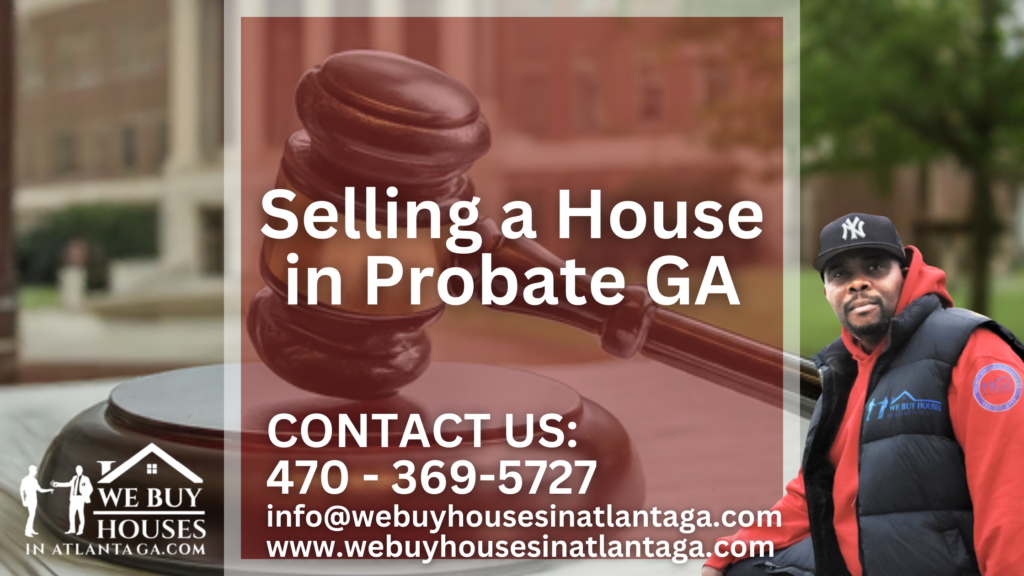
Selling a House in Probate GA
Probate properties represent an enticing opportunity for real estate investors and savvy buyers seeking discounts. However, navigating the probate process can be complex, especially for homeowners looking to sell. This article serves as a comprehensive guide for individuals involved in probate, shedding light on what probate entails and offering insights into successfully selling a property within this framework while maximizing returns.
Understanding Probate
Probate, in essence, is the legal process through which the assets of a deceased individual are administered and distributed. Whether the deceased left behind a will designating beneficiaries or passed away intestate (without a will), their assets fall under the jurisdiction of the executor or the court. It’s essential to grasp the two primary forms of probate: informal and formal.
In cases where there’s an original will or no dispute over heirs, an informal probate process ensues with minimal court involvement. However, the formal probate process, as discussed here, comes into play under more complex scenarios—such as substantial debts, contested wills, or missing original documents—prompting court intervention to resolve disputes and oversee proceedings.
Selling a House in Probate
The question often arises: Can a house be sold while in probate? The answer is affirmative. The sale of a property in probate is feasible through three key entities: the executor named in the will, tasked with managing asset distribution; the court-appointed administrator, responsible for intestate situations where heirs are present; and in cases of intestacy without heirs seeking administration, the court itself steps in.
Once the executor, administrator, or court determines the property’s rightful heirs, beneficiaries gain the opportunity to initiate the process of petitioning for probate property sale.
With this understanding of probate and its implications on property transactions, individuals involved can navigate the process more effectively, ensuring a smoother path towards selling probate properties while capitalizing on their investment potential.
Selling a House in Probate in GA: What You Need to Know
As an executor, your primary duty is to safeguard the assets of the estate for distribution among heirs or beneficiaries, as specified in the will. However, situations may arise where the estate faces significant debts or the property requires attention, such as overdue taxes. In such cases, the executor, administrator, or court may authorize the sale of the property to settle outstanding obligations, even if heirs are involved.
Consider this scenario: An elderly woman passes away, leaving an estate with two heirs. However, the estate carries debts totaling $90,000, including hospital and credit card bills, while possessing a home valued at $150,000 but lacking liquid assets. To discharge the debts, the executor may need to sell the property. After settling the debts, the remaining proceeds, in this case, $60,000, would be divided between the heirs.
Moreover, a property in probate may be subject to sale if the deceased passed away intestate without immediate heirs. In such instances, the courts can mandate the sale of the property, with profits allocated to the closest relatives.
Steps for Selling a House in Probate
If you own a property in GA that is stuck in probate and you’re struggling to find a way to sell, there is hope! Depending on local and state laws, the process of selling a probate property can be completed in four steps. The first step is having an executor or administrator assigned, if there wasn’t one already assigned by the deceased.
If you are assigned as the executor (or you and the executor are in agreement on how to continue), you now have the ability to decide whether to sell the property or keep it. Whether the estate owes money to creditors or you inherited a house in another state that doesn’t make sense to keep, you can decide to sell that property and walk away. But before you put up that For Sale sign, you’ll need to have the property appraised. Once that is complete, only then can you petition the Court so that you can list the property for sale on your own (FSBO) with a trusted realtor who has experience with probate properties, or sell it directly to an investor.
For those grappling with the process of selling a probate property in GA, there are actionable steps to follow:
- Valuation or Appraisal
Obtain a professional valuation or hire an appraiser well-versed in local laws governing property evaluation. Compliance with court-mandated selling prices, often set at 90% of the appraised value, underscores the importance of engaging a knowledgeable appraiser.
- Listing the House
Once appraised, file an intention to sell with the court, detailing the property’s value and preferred selling method, be it through auction, traditional market sale, or directly to an investor. Seek assistance from experienced real estate professionals familiar with probate properties to navigate this stage effectively.
- Offers
Evaluate offers based on your sale objectives. Whether prioritizing debt settlement, maximizing profits, or addressing property conditions, align offers with your specific goals to proceed judiciously.
Knowing what goals you need to meet with the sale of the property will help you decide which offer to accept so that you can move on to the next step…
- Notice of Proposed Action
Disclose to potential buyers the need for court confirmation before finalizing the sale. While this may prolong the process, transparent communication mitigates surprises and fosters informed decision-making.
- Bidding
Auctions, though a last resort due to their stringent regulations, can attract interested parties. The court oversees bids, ensuring compliance with established guidelines. In case of objections from heirs, the court intervenes to determine the next course of action.
- Finalization of Sale
Upon court approval of an offer, finalize the sale by filing necessary documents for distribution. Once approved, sign the title documents to formalize the property’s sale.\
Navigating the probate process entails diligence and adherence to legal protocols. By following these steps and leveraging expert guidance, selling a house in probate can proceed smoothly, facilitating the efficient distribution of assets in accordance with the deceased’s wishes.
Common Mistakes to Avoid When Selling a Probate Property
- Rushing the Process
The passing of a loved one often prompts a flurry of activities, including the sale of their property. However, moving too swiftly can lead to undervaluing the property or neglecting essential considerations. Whether driven by the need for closure or financial pressures, take the time to assess the property’s true worth before proceeding with the sale.
- Overlooking Real Estate Disclosures
Depending on what state you live in, Real Estate Disclosure laws can be almost as tricky as the probate process! These laws are a list of issues (such as lead paint or asbestos) that must be disclosed to the buyers about a home before closing on the property.
Most states require sellers and their agents to disclose in writing “material defects” about the home. According to the National Association of Certified Home Inspectors, material defects are “…a specific issue with a system or component of a residential property that may have a significant, adverse impact on the value of the property, or that poses an unreasonable risk to people. The fact that a system or component is near, at or beyond the end of its normal useful life is not, in itself, a material defect.”
Experienced real estate agents are great at navigating these tricky waters, but what if you inherited a house that you never lived in? How would you know what to disclose? In some states, the executor, person selling the property, and/or real estate agent may be exempt from filling out local real estate disclosure forms due to the property being in probate. This is because that person does not and did not live in the property, so would have no way of knowing what to disclose.
If you are unsure of your state laws, someone who is experienced in probate real estate (whether it be a real estate agent or investor who has purchased probate properties in the past) will be able to help you navigate these legal waters. If looking into the latter option, be sure to sell your property directly to an experienced investor who doesn’t mind purchasing a property in probate and is willing to take the risk of purchasing a home from someone who is unable to give proper disclosure. You do have options!
- Neglecting Legal Counsel
Engaging a proficient real estate lawyer specializing in probate matters is indispensable. These legal professionals possess the expertise to expedite the probate process and navigate its complexities with ease. From petitioning the court to initiating the property sale, their guidance ensures a smoother, less stressful journey. Even a consultation can provide invaluable insights, helping you avoid common pitfalls and streamline the sales process.
- Delaying Probate Proceedings
Grief often prompts a temporary pause in life’s affairs, including the probate process. However, delaying probate proceedings can have financial ramifications, with property taxes, utility bills, and mortgage payments accumulating over time. Initiate the probate process promptly to mitigate these expenses and preserve the estate’s assets, ensuring a smoother transition for all involved parties.
By steering clear of these pitfalls and seeking expert guidance where necessary, you can navigate the sale of a probate property with confidence and efficiency, achieving a successful outcome while honoring your loved one’s legacy.
Related Articles
Who Buys Houses in Probate?
Look no further – We Buy Houses in Atlanta GA specializes in purchasing houses in probate situations. As a direct house buying company, we’ve earned our reputation by offering cash solutions with minimal stress and fewer fees. Contact us today to receive a competitive cash offer for your probate property. We buy homes in any condition, helping you navigate the intricate process of selling a house in probate swiftly and hassle-free. Let us simplify the process and provide you with a smoother, faster transaction experience.


